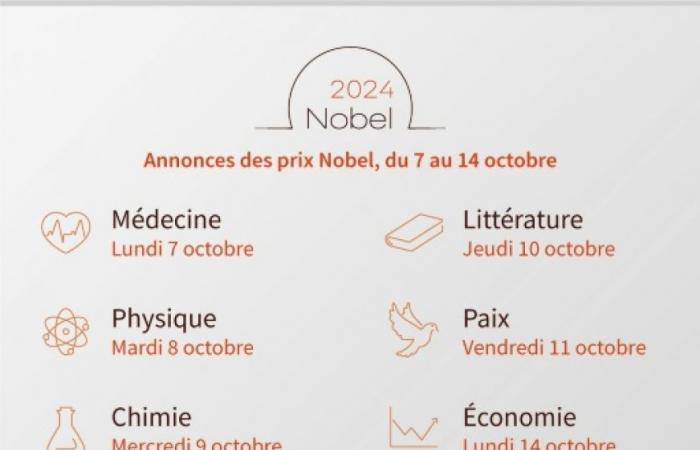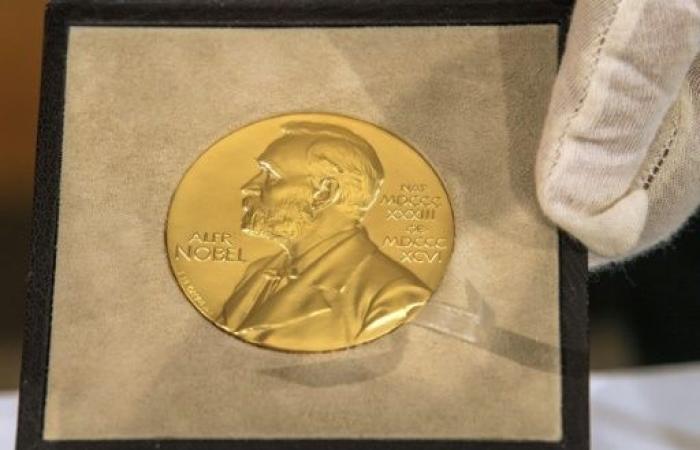The development of work on new materials and research assisted by artificial intelligence (AI) are in a good position to win the 2024 Nobel in chemistry on Wednesday, according to experts.
The prize, which will be announced at 11:45 a.m. in Stockholm (09:45 a.m. GMT), is the third Nobel of the season after the physics prize awarded Tuesday to British-Canadian physicists Geoffrey Hinton and American John Hopfield for crucial research in the development of AI.
This technology is also back on the list of favorites for the Chemistry Nobel.
Google DeepMind director John M. Jumper and CEO and co-founder Demis Hassabis – who have already received the prestigious Lasker Prize in 2023 – could win for the Alphafold AI model, which can predict the three-dimensional structure of proteins according to their amino acid.
Both men are listed by the analysis firm Clarivate, which predicts potential scientific Nobel laureates based on citations in research articles.
David Pendlebury, director of the firm, nevertheless specifies that if the article by Jumper and Hassabis published in 2021 has been cited thousands of times, it would be unusual for the Nobel jury to reward a work so quickly after its publication.
Another name often cited is that of the American-Jordanian Omar Yaghi.
The work of the professor of chemistry at the University of Berkeley focuses on metal-organic networks (MOR) and their porous properties allowing the absorption of dangerous gases.
Products using these materials are already on sale. For Lars Broström, science journalist at SR radio, it is therefore “time to award him a Nobel Prize”.
– “Biochemical methods” –
Other names such as the Japanese Susumu Kitagawa and Makoto Fujita, also considered pioneers of this technology, are in a good position.
According to the SR journalist, the American-Taiwanese biochemist Chi-Huey Wong also has a chance for having invented “biochemical methods used in the pharmaceutical industry”.
In this area, the name of the American chemist Robert Langer, a pioneer in the method of drug administration, is circulating in particular: he is “one of the most cited scientists in the world”, argued Lars Broström.
Karl Deisseroth, psychiatrist and specialist in bioengineering, could also be consecrated by the Nobel committee.
The researcher has invested in the field of optogenetics, which makes neurons sensitive to light. Under his leadership, researchers have managed to make a mouse brain completely transparent to see what is happening there.
Although their area of expertise is physical sciences, researchers Roberto Car (Princeton University) and Michele Parrinello (Italian Institute of Technology) are back in the forecasts for their “Car-Parrinello” method, used to calculate molecular dynamics.
The prize could also recognize US-based researchers James J. Collins, Michael Elowitz and Stanislas Leibler for their work on “synthetic genetic circuits” that launched the field of “synthetic biology.”
Finally, Zhenan Bao, professor of chemical engineering at Stanford University, has also been cited for several years.
This American of Chinese origin has developed, with her team, an “electronic skin” which integrates tiny transistors into a special ultra-thin film in order to reproduce the sense of touch.
Awarded since 1901, the Nobel Prizes recognize people who have worked for “the benefit of humanity”, in accordance with the wish of their creator, the Swedish inventor Alfred Nobel.
Last year, the Nobel Prize in Chemistry was awarded to a trio for their research on nanoparticles called quantum dots: Moungi Bawendi, Louis Brus and Alexei Ekimov, born respectively in France, the United States and the USSR.
These very small components of nanotechnology now diffuse light from TVs and LEDs and can also guide surgeons when removing tumor tissue.
As with other Nobels, the chemistry prize has been criticized for its lack of diversity and equality. Since 1901, only eight women have been crowned, out of 114 winners.
The season continues with the Nobel Prize for Literature on Thursday and the Nobel Peace Prize on Friday in Oslo.
The Nobel Prize in Economics, awarded for the first time in 1969, will be awarded on Monday October 14.
For the winners of the 2024 vintage, the check accompanying the prize is for eleven million crowns (920,000 euros), to be shared in the event of multiple winners.




